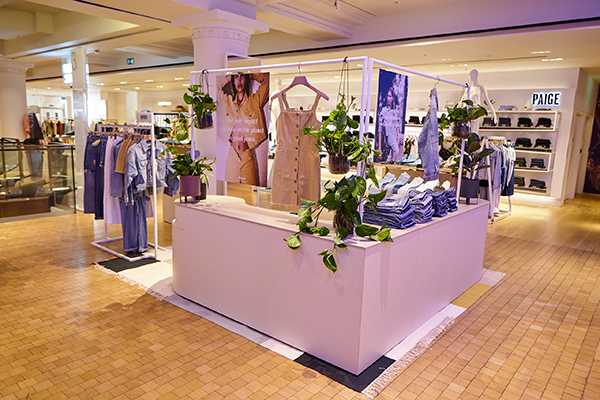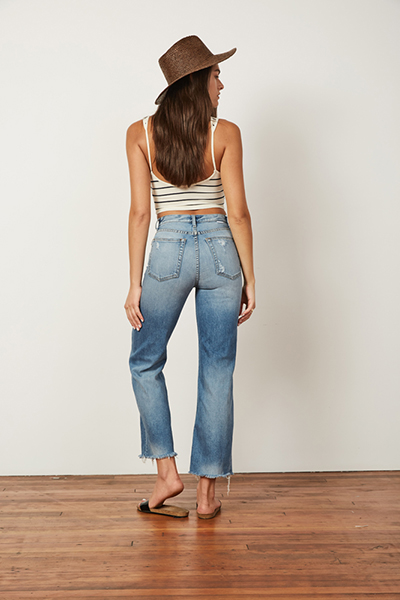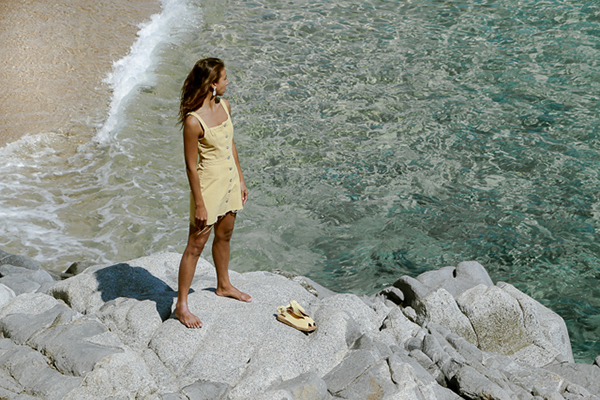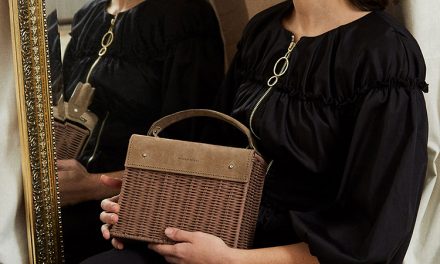The Vendeur Profile: Jordan Nodarse of Boyish Jeans
Image: Boyish Jeans
You may not know Jordan Nodarse but you certainly know his work. Having begun responsible denim lines for GRLFRND and Reformation, now he has turned his attention to his own label, Boyish Jeans. To celebrate the launch of Boyish Jeans at Selfridges, we found out more about how Jordan is cleaning up ‘dirty denim’.
We’re all familiar with denim’s ‘dirty’ reputation. Made from cotton, the thirstiest fabric on the planet, it requires a huge amount of land, energy and water to make one pair of jeans. It reportedly takes around 1,800 gallons of water to grow enough cotton to make a pair of jeans. That’s even before the denim has been dyed and washed, a process which takes around 9,982 gallons of water. Jordan Nodarse is not the only designer to be concentrating on lessening the environmental impact of denim. However his new line Boyish has gone one step further than simply saving water. The LA based brand recently came to the UK, launching a Summer collection in London’s Selfridges. We caught up with Jordan on his trip to London to find out more about his innovative methods and ideas for the future.
Bearing in mind he had only stepped off a plane from Berlin that morning, then cycled to our meeting at Selfridges, Jordan Nodarse showed no signs of fatigue. He proudly gave us a tour of the new Boyish concession. Its a California inspired space situated in Selfridges Denim Studio on the third floor. Not only were pieces from the new Summer collection available to buy, but a large perspex box held donated items of old denim. For a limited time, customers visiting the concession can donate their old denim and receive 20% off new Boyish product.
Recycling is something close to Jordan’s heart. Over a cup of Earl Grey in the Hemsley and Hemsley cafe, he spoke animatedly about how important recycling is to the Boyish brand. ‘We focus a lot on recycling. My design aesthetic is built around circularity which is preventing things from ending up in landfill,’ he told us. While his product is produced ethically using sustainable fabrics, he has taken this to the next level by developing his own denim. Boyish have worked closely with Lenzing to create an innovative fabric designed to reduce water usage while being durable. Cotton is blended with recycled cotton and Refibra Tencel, sourced from sustainably grown eucalyptus trees. For every tree that is used, and they use the whole tree, two more are planted.
‘We focus a lot on recycling. My design aesthetic is built around circularity which is preventing things from ending up in landfill.’ – Jordan Nodarse
‘Our new fabrics are 17% OCS certified organic cotton that is sourced from a farm on the Western side of Turkey. Then 43% regenerated cotton from industrial and post consumer jeans. Coupled with 40% Refibra by Tencel fibres,’ Jordan explains. This is a huge amount of recycled cellulosic fibre compared to other areas of the denim sector. Boyish factories reuse any leftover scraps of cotton or denim fabric in order to create new garments. Jordan believes this to be the most environmentally positive way forward. This is because Boyish are able to reduce the amount of virgin cotton they generate, thereby reducing their environmental impact. ‘Cotton is a very water intensive crop and it takes a large amount of land to grow it. Land that could be used to grow food,’ he laments. However he is keen to work closely with his growers, to ensure that what virgin cotton he does use, has been farmed ethically.
Responsible manufacturing doesn’t end with choosing sustainable fabrics. The indigo dye which is used in denim production can be highly problematic as it needs to be mixed with caustic soda. If the water used to intensively wash the dyed fabric isn’t treated properly, high levels of salt and chemicals end up in the sea or local fresh water sources. Boyish use a reduced indigo dye from Dyestar, known for their Bluesign and Green Peace certified dyes. They also treat the water they use to wash the denim, then recycle it. So any water that does leave the factory is perfectly clean to consume. Enzymes are then used to ‘distress’ the jeans and give them that gorgeous vintage look that Jordan loves.
‘With denim a lot of factories don’t do caustic soda recycling. We reduce ours to the bare minimum, 80% less than normal amounts.’ – Jordan Nodarse
Making jeans sustainably isn’t easy, ‘you have to be dedicated’’ he tells us. And he is. Having begun his career initially as a musician, he thrifted old pairs of Levis to create ultra skinny jeans like those worn by Bruce Springstein. After receiving orders from other admiring musicians, he left music behind to pursue a career in fashion. First came the launch of GRLFRND denim, created for Revolve. Each pair was made from deadstock denim Nodarse found in the warehouse of a recently defunct denim company. Then he moved on to design Reformations’ first denim range, known for its dramatically sustainable design. However Jordan wanted to do more. In 2018, Boyish was born. Its an ode to his love of stiff, vintage style denim, but doesn’t place a high price on the environment.
Starting the company has been a rollercoaster ride. In the short amount of time since Boyish’s launch, the name has achieved cult status amongst denim lovers and fashionistas alike. But Nodarse isn’t one to rest on his laurels. His interest in regenerative farming and agriculture takes him all over the world as he meets his cotton growers. With plans to involve himself further in the production of organic cotton, he hopes to grow his own hydroponically in the future. For now, we’ll have to be content with Boyish’s current offering. But with knitwear and other pieces in the works, it won’t be long before Boyish will be in every British girls wardrobe.
Disclaimer: The people and models in the images featured are not associated with The Vendeur and do not endorse it or the products shown. This post may contain affiliate links. Prices correct at time of publishing.








